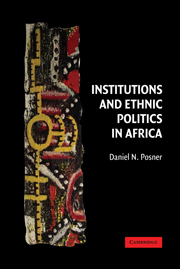Book contents
- Frontmatter
- Contents
- Preface
- INSTITUTIONS AND ETHNIC POLITICS IN AFRICA
- 1 Introduction
- I Introduction to Part I
- II Introduction to Part II
- III Introduction to Part III
- IV Introduction to Part IV
- 9 Regime Change and Ethnic Politics in Africa
- 10 Beyond Regime Change, Beyond Africa
- Appendices
- Bibliography
- Index
- Titles in the series
10 - Beyond Regime Change, Beyond Africa
Published online by Cambridge University Press: 05 June 2012
- Frontmatter
- Contents
- Preface
- INSTITUTIONS AND ETHNIC POLITICS IN AFRICA
- 1 Introduction
- I Introduction to Part I
- II Introduction to Part II
- III Introduction to Part III
- IV Introduction to Part IV
- 9 Regime Change and Ethnic Politics in Africa
- 10 Beyond Regime Change, Beyond Africa
- Appendices
- Bibliography
- Index
- Titles in the series
Summary
Conceived narrowly, this is a book about how transitions between multi-party and one-party rule affect the relative political salience of tribal and language group identities in Zambia. But it is also a book about how political institutions affect social identities more broadly. Its empirical focus may be on an African case, but its implications extend well beyond the African continent. The specific argument the book advances is about how regime change affects people's choices between tribal and linguistic identities, but the general logic it articulates extends well beyond these particular independent and dependent variables. The logic it provides offers a general set of guidelines for thinking about when and why people choose the social identities they do and when and why one social cleavage rather than another becomes salient in political interactions. It also provides a vocabulary and a conceptual framework for thinking about the many different aspects of identity change. Thus while the specific application presented in the preceding chapters may be somewhat narrow, the implications of the analysis and the applications of the argument and framework are potentially far reaching.
INSTITUTIONS AND BOUNDARY CHANGE
Take the argument about how institutions affect the kinds of identities that become salient. One of the book's central premises is that the identities and cleavages that will emerge as bases of political competition will depend on the boundaries of the arena in which political and social interactions take place.
- Type
- Chapter
- Information
- Institutions and Ethnic Politics in Africa , pp. 274 - 288Publisher: Cambridge University PressPrint publication year: 2005



